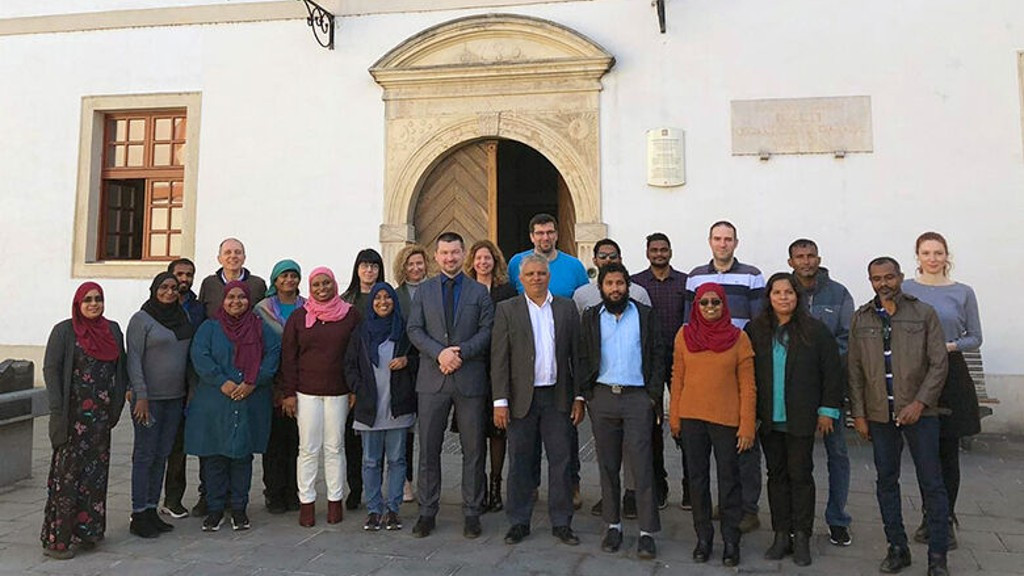The UOC underlines its commitment to the digital transformation of education with a pioneering project in the Maldives
It heads a key training programme helping the country's National University to transition towards a bimodal (face-to-face and online) model
The UOC's more than 25 years of experience in online education means it has been able to transfer excellence in e-learning for the digital transformation to universities around the world, particularly in Latin America. Over the last three years, its promotion of the digital transformation has broadened in geographical scope to include Asia, with projects such as that concluding this 2022 at the Maldives National University (MNU): the Erasmus+ AMED Project: Advancing higher education in Maldives through E-learning Development.
Transferring knowledge around e-learning is of crucial importance, given that digital transformation is one of the main challenges currently faced by education. The COVID-19 pandemic has made this clearer than ever, spurring some institutions to ramp up their adaptation processes. For the Republic of Maldives, which has a face-to-face education model, transforming the system also entails contributing to democratizing and expanding access to higher education for its close to 525,000 inhabitants scattered across 188 islands.
Transforming the education model: from face-to-face to bimodal
The chief mission of the Maldives project is to transform the country's education model via the implementation of blended learning to help democratize and expand its people's access to quality higher education.
In the MNU project, the UOC has been represented by the research and teaching staff members Marcelo Maina, Nati Cabrera, Lourdes Guàrdia, Maite Fernández-Ferrer and Albert Sangrà, of the Faculty of Psychology and Education Sciences and of the Edul@b research group. Also participating were the University of Zagreb's Faculty of Organization and Informatics and the Croatian Academic and Research Network (CARNET).
What has the AMED project involved?
The part of the project led by the UOC team consisted of a series of knowledge and experience transfer activities, as well as the co-design and implementation of a training programme. The programme deals with institutional transformation towards a hybrid model and is aimed at university senior management, teaching staff and teaching support staff.
With this goal in mind, the UOC designed work sessions in Barcelona to transfer the university's knowledge of integrating technology into three key fields: teaching, technology and organization. In light of MNU's specific needs, it selected the most appropriate topics to be dealt with in the sessions and identified the UOC staff who could participate and share their experiences with 17 of the National University's representatives.
During the work sessions, the MNU delegation familiarized themselves with the UOC's departments and services and how they interrelate. Eleven sessions were held with the representatives of the various departments, to provide a more detailed explanation of their functions, and a final activity, by way of conclusion, allowed attendees to discuss and sketch out a prioritization plan and a timetable for actions to be implemented at the MNU. On this basis, a road map was drawn up to provide a regulatory and operational framework to adopt blended learning in the different areas.
An ongoing training programme
But the AMED project has gone further. The initiative has also encompassed the participatory design of an online training programme based around MNU's requirements. The programme is aimed at university staff who are key to the education model transformation process and consists of two pathways: one for the teaching staff and another for senior management. A pilot programme was implemented including preliminary training for the university's own facilitators: 16 members of the Centre for Educational Technology and Excellence (CETE) and 14 members of the MNU's teaching staff. A total of 51 members of the university's staff successfully completed the programme, which will continue to be developed after the pilot.
A UOC project with a direct impact on Maldives National University
For Marcelo Maina, director of the Master's Degree in Education and ICT (E-learning) programme, the AMED project has been a success, in enabling the implementation of a training programme, but he also stressed the "enhancement of the knowledge of teaching staff and senior management around the design, implementation and adoption of blended learning." What's more, the programme will continue following the positive results of the pilot.
Maina also highlighted how the project has helped consolidate the position of the MNU's Center for Educational Technology and Excellence: "It should be noted how we have empowered a technology centre, which has grown, we have created a pathway and we have had a direct impact upon practices, as shown by the feedback on the experience, with a significant increase in staff's predisposition towards gaining and implementing knowledge."
This project, like others from the UOC's eLearning Innovation Center (eLinC) involving the provision of advice to education centres and actions by the Office of the Vice President for Globalization and Cooperation, highlights the UOC's commitment to the digital transformation of education.

The UOC's AMED project helps foster Sustainable Development Goal (SDG) 4, Quality Education.
UOC R&I
The UOC's research and innovation (R&I) is helping overcome pressing challenges faced by global societies in the 21st century, by studying interactions between technology and human & social sciences with a specific focus on the network society, e-learning and e-health.
The UOC's research is conducted by over 500 researchers and 51 research groups distributed between the university's seven faculties, the E-learning Research programme, and two research centres: the Internet Interdisciplinary Institute (IN3) and the eHealth Center (eHC).
The University also cultivates online learning innovations at its eLearning Innovation Center (eLinC), as well as UOC community entrepreneurship and knowledge transfer via the Hubbik platform.
The United Nations' 2030 Agenda for Sustainable Development and open knowledge serve as strategic pillars for the UOC's teaching, research and innovation. More information: research.uoc.edu
Experts UOC
Press contact
-
Editorial department
